Freestyle skiing is about creativity, airtime, and precision in motion — but every jump and hard landing sends powerful shockwaves up your legs. After a few park laps, that sharp, bruised pain down the shins — the infamous shin bang — can quickly kill your flow.
While boots often take the blame, your ski socks play a critical role in how much impact your legs can handle. The right pair of freestyle ski socks cushions heavy landings, improves boot fit, and drastically reduces shin pain — keeping you focused on tricks, not trauma.
The Freestyle Challenge: Why Regular Ski Socks Fall Short
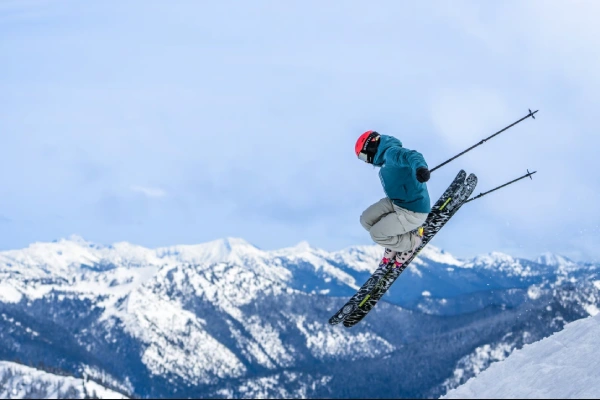
Park skiing demands gear that can absorb shock and stay secure through jumps, grabs, and spins. Regular alpine socks focus on warmth and comfort — not repeated landings from six feet above the snow.
That’s why thick, standard socks often leave your feet cramped, calves numb, and shins sore. Freestyle-specific socks solve these issues through smarter construction and materials:
- Targeted padding zones in the shins, heels, and forefoot to absorb repeated impact
- Enhanced elasticity and non-slip cuffs that keep the sock from sliding mid-run
- Balanced warmth and breathability for alternating between high-energy laps and lift rides
Understanding Shin Bang — Causes, Symptoms, and Prevention
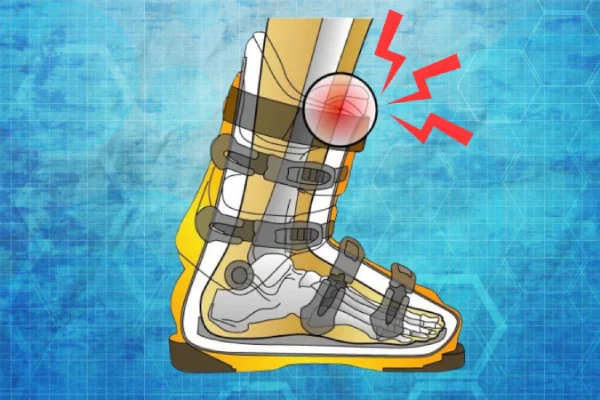
Shin bang isn’t a medical condition — it’s a mechanical one. It happens when the shin repeatedly slaps the boot tongue during landings, causing inflammation and soreness.
Common causes include:
- Loose boots: the shin hits the tongue on impact
- Over-tight boots: restricted circulation increases fatigue
- Uneven sock thickness: wrinkles or pressure points create micro-trauma
Freestyle skiers face this constantly — jump, land, repeat. Symptoms range from mild tenderness to deep bruising after a long park day.
Prevention starts with your socks
The best park socks counteract shin bang with:
- Anatomical fit that eliminates sock slippage inside the boot
- Cushioned front panels that disperse boot pressure
- Light compression zones around the calf and arch for stability
- Seamless toes and Y-heels to prevent internal friction
Cushioning That Works: Where Freestyle Socks Absorb Shock
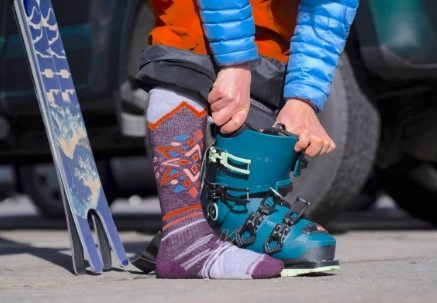
Not all padding is equal. Too much bulk, and your foot loses contact with the boot liner. Too little, and you feel every vibration. Freestyle socks use strategic cushioning zones — thicker only where impact is highest.
Key impact zones
- Shin front: Dense padding softens the blow of forward landings.
- Heel strike area: Reinforced terry loops dampen repeated impacts from switch landings.
- Ball of foot: Moderate cushioning helps absorb lateral shock during rotations.
The science of impact absorption
Premium freestyle ski socks use a blend of:
- Merino wool – thermoregulating and naturally springy.
- Nylon – abrasion-resistant structure that holds shape.
- Spandex/Lycra – dynamic elasticity for secure compression zones.
Some advanced models even map density by knit pattern, creating “3D cushioning” that’s soft under stress but firm under compression — exactly what you need for big jumps and harsh landings.Fit, Compression, and Freedom of Movement
Unlike race socks that emphasize tight, static compression, freestyle socks prioritize flexible support. You need enough structure to keep muscles steady, but enough mobility to tweak, grab, and spin without restriction.
Ideal features for park riders
- Anatomical shaping: Left/right-specific designs match your leg contours.
- Support zones: Moderate compression around the arch and ankle for stability.
- Stay-up cuffs: Prevent the sock from bunching during spins or landings.
- Lycra blend: Gives four-way stretch for a consistent fit all day.
These “support zones” aren’t medical-grade compression — they enhance blood flow and prevent fatigue.
Breathability and Moisture Management for All-Day Park Sessions
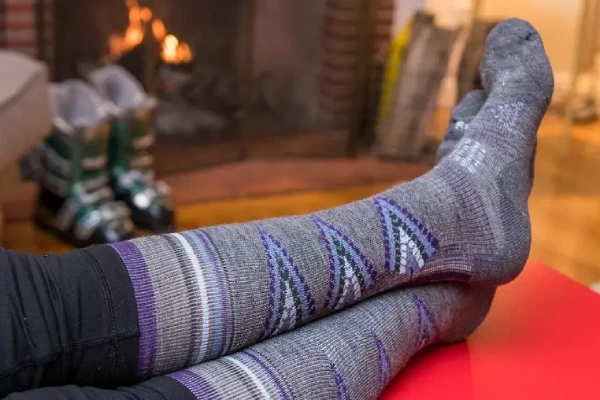
Landing after a jump generates both impact and heat. If sweat can’t escape, your socks become damp, heavy, and cold. Freestyle socks use moisture-management technology to keep feet dry and responsive.
How modern ski socks manage moisture
- Merino fibers absorb vapor inside the fiber core and release it slowly — keeping insulation dry.
- Synthetic yarns like polypropylene wick sweat outward and dry rapidly.
- Ventilation zones along the instep and calf back allow warm air to vent.
- Antimicrobial finishes (or natural Merino keratin) reduce odor buildup over long sessions.
Moisture control isn’t just comfort — it’s performance. A dry sock maintains its cushioning loft, keeping shins protected even after hours of park laps.
Choosing the Right Pair — A Park Rider’s Checklist
When shopping for freestyle ski socks, use this quick checklist to find your perfect match:
✅ Targeted shin and ankle padding — soft but not bulky
✅ Arch and calf support bands — stability without squeezing
✅ Seamless toe & Y-heel — zero internal friction
✅ Moisture-wicking Merino + synthetic blend
✅ Mid-thickness profile — compatible with snug park boots
✅ Over-the-calf height — full protection from boot tongue rub
✅ Elastic cuff — stays put through every landing
If you spend most of your time in the terrain park, look for “park series” or “impact zone” socks — they’re tuned specifically for jump-oriented riding.
Pro Tips: Sock + Boot Harmony = Park Performance
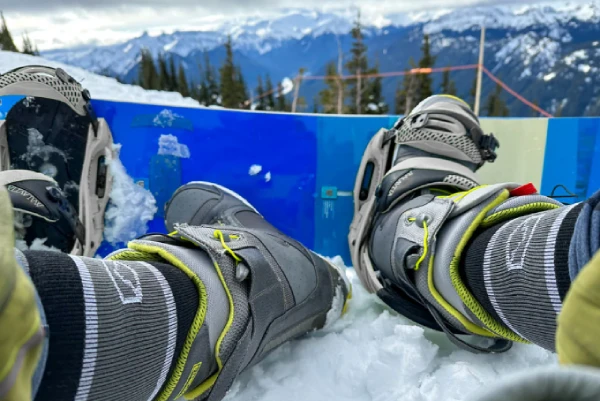
Even the best sock can’t save a poor boot fit. Think of your boot and sock as one system:
- Your boot liner should compress the sock evenly — no pressure points.
- Avoid doubling up socks; it traps moisture and reduces circulation.
- Replace worn-out liners or stretched socks regularly; thin spots ruin shock absorption.
- After each session, air-dry your socks completely — never on direct heat — to preserve elasticity.
Together, these habits extend both comfort and durability, giving you a consistent feel from your first rail slide to your last backflip attempt.
FAQs about Freestyle Ski Socks
What makes freestyle ski socks different from regular ski socks?
They’re built for high-impact skiing, with focused shin and heel cushioning, stronger elastic support, and breathable materials that prevent shin bang and slippage.
Do freestyle ski socks really help prevent shin bang?
Absolutely — paired with a proper boot fit, dense shin padding and snug compression zones minimize pressure and movement between leg and boot.
Are thicker socks better for park skiing?
Not necessarily. Mid-weight socks with targeted padding and flexible materials deliver warmth, comfort, and control without restricting blood flow.
Should I wear compression socks for freestyle skiing?
Medical-grade compression socks are best for recovery. Freestyle socks use light athletic compression — enough to stabilize muscles without reducing range of motion.
How do I choose the best freestyle ski socks?
Look for impact padding, seamless construction, quick-dry Merino blends, and over-the-calf height — everything you need for warmth and protection without bulk.hioned, and protected from shin bang during every lap in the park.
Conclusion: Land Soft, Ride Long
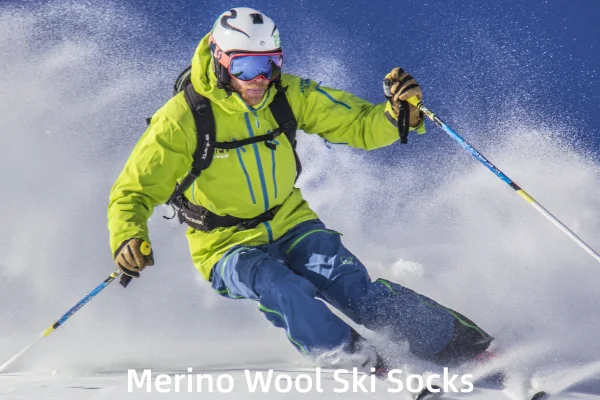
Every landing tests the harmony between your boots, feet, and socks. A premium pair of freestyle ski socks absorbs shock, prevents shin bang, and lets you ride harder, longer, and cleaner.
Whether you’re perfecting your first 180 or stomping advanced tricks, the right socks protect your legs so you can focus on what really matters — style and progression.
👉 Max Hosiery partners with leading brands to design and manufacture advanced performance ski socks.
Contact us to build your next line of high-impact, athlete-tested gear.
